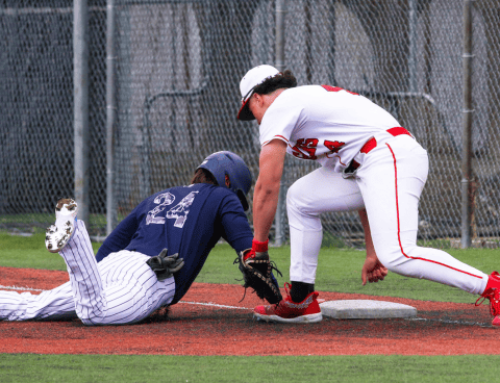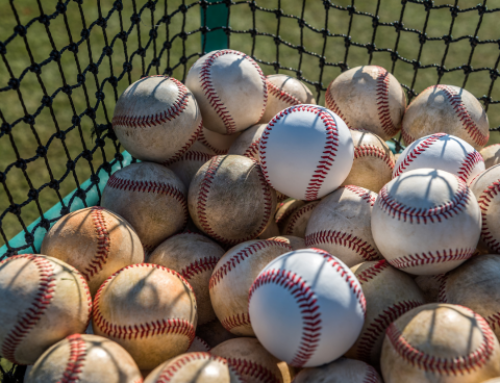Interview with Hunter Pence
I asked Hunter Pence about one of his monster games last season, in which he went three for four with a two-run triple. He had no idea what I was talking about. Immediately, it was clear that the Astros’ rookie centerfielder doesn’t care much for numbers, unless you’re talking wins.
It’s too bad Hunter doesn’t focus on numbers, because his are some of the best in baseball, and by far the most impressive among rookies. The 6’4”, 210-pounder batted .322 and stole 11 bases in his first season with the Astros. Despite being slowed slightly by a wrist injury toward the end of the summer, Hunter still finished an impressive third in the National League Rookie of the Year voting. Hunter tells us about his call-up, sacrifices and the grueling off-season training program that keeps him running full-speed ahead.
STACK: You had a nice stretch of hitting in September. Were you just feeling it at the plate?
Pence: My swing’s been feeling good. My wrist is feeling better, and I’m getting healthy. Every day is different, because I’m facing different pitchers. Sometimes they pitch you nasty; other times you get pitches to hit. It’s a chess match every time you go up to bat. You just try not to swing at bad pitches and find one to hit. I just happened to come up in the right situations and won the battle, so to speak. A lot of times, success isn’t that far from failure in baseball. You can hit the ball hard right at people, or you can hit balls that find holes. I guess everything has just been lining up for me.
STACK: How did you stay sharp while you were out with a wrist injury?
Pence: Mentally, there’s nothing you can do but try to stay positive. I tried to do all the rehab, and I made sure to do my work in the weight room. I kept my body in shape as far as running and sprinting, and I really worked on my defense. As far as hitting, I stayed locked in by watching games and opposing teams’ pitchers. I used this tennis ball machine to do an eye drill every chance I could. The machine shoots tennis balls with numbers and colors at various speeds. You just train yourself and sharpen your eyes, so getting back in the box is not so overwhelming.
STACK: You had a tremendous rookie season. Did you anticipate having this much success immediately?
Pence: I never really thought about that. I just went out and played, but I always expect the best from myself. When I first came up, I was a little overwhelmed; everyone was wondering what I would do in the Big Leagues. But I calmed down and started playing the game how I always have.
STACK: Have you always dreamed of playing professional baseball?
Pence: Yes, since I was a kid. Back then, I was kind of naïve and thought I was definitely going to make it; then you grow up and see that it’s not that easy. I always knew I had a chance, but after my junior year in high school, I made the decision to put everything I had into baseball. I made the sacrifice to work out and do all the hitting and everything I could to chase the dream. I set aside a lot of things, like getting a job or pursuing a business goal.
STACK: What kind of training regimen did you have back in high school?
Pence: My dad set me up with a weight trainer who was a bodybuilder. So my weight lifting program when I first started was kind of crazy. I was working out about five days a week for about three hours a day doing bodybuilding. I was eating as much food as I could to gain mass and get bulky.
STACK: What’s your training like now?
Pence: My training is a lot different. I incorporate more movement and flexibility into workouts, and I don’t focus on mass. In the off-season, I work out at REPS [Arlington, Texas] with [owner] Steve Senay. He has me do hour-long explosive training sessions with 100-percent movement and core work. A lot of drills incorporate balance, coordination and athleticism. It pushes my body to the limit, so I do it about three days a week. I also try to lift weights about five times per week.
STACK: Do you remember your college recruiting process?
Pence: Yeah. It was really important for me to go out and talk to coaches and give them my schedule and stats and let them know I was interested in their schools. It’s not like they come after you; you have to do your own work. That’s how I landed at Texarkana, a great junior college. I would recommend, for almost all baseball players, going to junior college right out of high school. I did it with a buddy of mine who also played ball. We were like a package deal.
STACK: Do you have any stories about mammoth homers in high school?
Pence: I only hit two homeruns in my whole high school career. I was fast and hit a lot of doubles. I hit the ball hard, but I didn’t have backspin.
STACK: What is your biggest source of motivation when facing a tough workout?
Pence: You have to be mentally tough to finish the REPS program. It’s so hard that I can’t eat any food before, or I will lose it. And I do it first thing in the morning. So I just wake up, drink my orange juice and listen to some song that pumps me up. Then I get out there, stretch out and go at it for an hour. That whole time, I’m thinking about my goals and where I want to get; I’m thinking about stealing bases and playing centerfield for the Astros.
The hardest thing to do is override your brain. Your brain wants to protect your body, so it doesn’t want you to give 100 percent all the time. Steve’s whole thing is about redefining 100 percent, because you can go hard, but you’re not really going 100 percent. You need your first and last reps to be the same. If Steve is in my face telling me to go faster, and I do, then I should have been going that fast in the first place.
STACK: What’s the hardest thing you’ve overcome to be a pro baseball player?
Pence: Probably just the mental side of it—believing in myself. When I first got drafted, I felt like I was the furthest thing away from the Big Leagues; the majors seemed like they were a completely different level. You have to overcome a lot before you believe that you can do it, and you see it in a lot of your teammates when you’re coming up together. It’s all the same battle.
STACK: What’s been your most memorable moment as an athlete?
Pence: The call up. When I finally got my call-up, all the work I had done and everything I put into it between junior high school and that day was going through my head. Everything I had done since Little League was for that day. That is the biggest moment I ever had. I was on the top step, in the hole, and we were down by a run. We just made the last out, but the manager turned and smiled at me. I was wondering why he was smiling, because we had just lost. He looked at me and said, “Congrats Pency. You’re going to the Big Leagues.”
STACK: What are your goals for the next couple years?
Pence: Basically, just find a way to win. That’s all that matters. If you’re a player who helps your team win, you’re going to be a valuable asset. That’s all I care about.
STACK: If you could speak directly to a high school baseball player, what would you tell him?
Pence: Prepare yourself. Preparation is the key to success. All the work you put in away from the field will eventually pay off on the field. If you are more prepared than your opponents, then you’re going to give your team a better chance to win. Preparation also provides confidence, and confidence can go a long way.
RECOMMENDED FOR YOU
MOST POPULAR
Interview with Hunter Pence
I asked Hunter Pence about one of his monster games last season, in which he went three for four with a two-run triple. He had no idea what I was talking about. Immediately, it was clear that the Astros’ rookie centerfielder doesn’t care much for numbers, unless you’re talking wins.
It’s too bad Hunter doesn’t focus on numbers, because his are some of the best in baseball, and by far the most impressive among rookies. The 6’4”, 210-pounder batted .322 and stole 11 bases in his first season with the Astros. Despite being slowed slightly by a wrist injury toward the end of the summer, Hunter still finished an impressive third in the National League Rookie of the Year voting. Hunter tells us about his call-up, sacrifices and the grueling off-season training program that keeps him running full-speed ahead.
STACK: You had a nice stretch of hitting in September. Were you just feeling it at the plate?
Pence: My swing’s been feeling good. My wrist is feeling better, and I’m getting healthy. Every day is different, because I’m facing different pitchers. Sometimes they pitch you nasty; other times you get pitches to hit. It’s a chess match every time you go up to bat. You just try not to swing at bad pitches and find one to hit. I just happened to come up in the right situations and won the battle, so to speak. A lot of times, success isn’t that far from failure in baseball. You can hit the ball hard right at people, or you can hit balls that find holes. I guess everything has just been lining up for me.
STACK: How did you stay sharp while you were out with a wrist injury?
Pence: Mentally, there’s nothing you can do but try to stay positive. I tried to do all the rehab, and I made sure to do my work in the weight room. I kept my body in shape as far as running and sprinting, and I really worked on my defense. As far as hitting, I stayed locked in by watching games and opposing teams’ pitchers. I used this tennis ball machine to do an eye drill every chance I could. The machine shoots tennis balls with numbers and colors at various speeds. You just train yourself and sharpen your eyes, so getting back in the box is not so overwhelming.
STACK: You had a tremendous rookie season. Did you anticipate having this much success immediately?
Pence: I never really thought about that. I just went out and played, but I always expect the best from myself. When I first came up, I was a little overwhelmed; everyone was wondering what I would do in the Big Leagues. But I calmed down and started playing the game how I always have.
STACK: Have you always dreamed of playing professional baseball?
Pence: Yes, since I was a kid. Back then, I was kind of naïve and thought I was definitely going to make it; then you grow up and see that it’s not that easy. I always knew I had a chance, but after my junior year in high school, I made the decision to put everything I had into baseball. I made the sacrifice to work out and do all the hitting and everything I could to chase the dream. I set aside a lot of things, like getting a job or pursuing a business goal.
STACK: What kind of training regimen did you have back in high school?
Pence: My dad set me up with a weight trainer who was a bodybuilder. So my weight lifting program when I first started was kind of crazy. I was working out about five days a week for about three hours a day doing bodybuilding. I was eating as much food as I could to gain mass and get bulky.
STACK: What’s your training like now?
Pence: My training is a lot different. I incorporate more movement and flexibility into workouts, and I don’t focus on mass. In the off-season, I work out at REPS [Arlington, Texas] with [owner] Steve Senay. He has me do hour-long explosive training sessions with 100-percent movement and core work. A lot of drills incorporate balance, coordination and athleticism. It pushes my body to the limit, so I do it about three days a week. I also try to lift weights about five times per week.
STACK: Do you remember your college recruiting process?
Pence: Yeah. It was really important for me to go out and talk to coaches and give them my schedule and stats and let them know I was interested in their schools. It’s not like they come after you; you have to do your own work. That’s how I landed at Texarkana, a great junior college. I would recommend, for almost all baseball players, going to junior college right out of high school. I did it with a buddy of mine who also played ball. We were like a package deal.
STACK: Do you have any stories about mammoth homers in high school?
Pence: I only hit two homeruns in my whole high school career. I was fast and hit a lot of doubles. I hit the ball hard, but I didn’t have backspin.
STACK: What is your biggest source of motivation when facing a tough workout?
Pence: You have to be mentally tough to finish the REPS program. It’s so hard that I can’t eat any food before, or I will lose it. And I do it first thing in the morning. So I just wake up, drink my orange juice and listen to some song that pumps me up. Then I get out there, stretch out and go at it for an hour. That whole time, I’m thinking about my goals and where I want to get; I’m thinking about stealing bases and playing centerfield for the Astros.
The hardest thing to do is override your brain. Your brain wants to protect your body, so it doesn’t want you to give 100 percent all the time. Steve’s whole thing is about redefining 100 percent, because you can go hard, but you’re not really going 100 percent. You need your first and last reps to be the same. If Steve is in my face telling me to go faster, and I do, then I should have been going that fast in the first place.
STACK: What’s the hardest thing you’ve overcome to be a pro baseball player?
Pence: Probably just the mental side of it—believing in myself. When I first got drafted, I felt like I was the furthest thing away from the Big Leagues; the majors seemed like they were a completely different level. You have to overcome a lot before you believe that you can do it, and you see it in a lot of your teammates when you’re coming up together. It’s all the same battle.
STACK: What’s been your most memorable moment as an athlete?
Pence: The call up. When I finally got my call-up, all the work I had done and everything I put into it between junior high school and that day was going through my head. Everything I had done since Little League was for that day. That is the biggest moment I ever had. I was on the top step, in the hole, and we were down by a run. We just made the last out, but the manager turned and smiled at me. I was wondering why he was smiling, because we had just lost. He looked at me and said, “Congrats Pency. You’re going to the Big Leagues.”
STACK: What are your goals for the next couple years?
Pence: Basically, just find a way to win. That’s all that matters. If you’re a player who helps your team win, you’re going to be a valuable asset. That’s all I care about.
STACK: If you could speak directly to a high school baseball player, what would you tell him?
Pence: Prepare yourself. Preparation is the key to success. All the work you put in away from the field will eventually pay off on the field. If you are more prepared than your opponents, then you’re going to give your team a better chance to win. Preparation also provides confidence, and confidence can go a long way.












